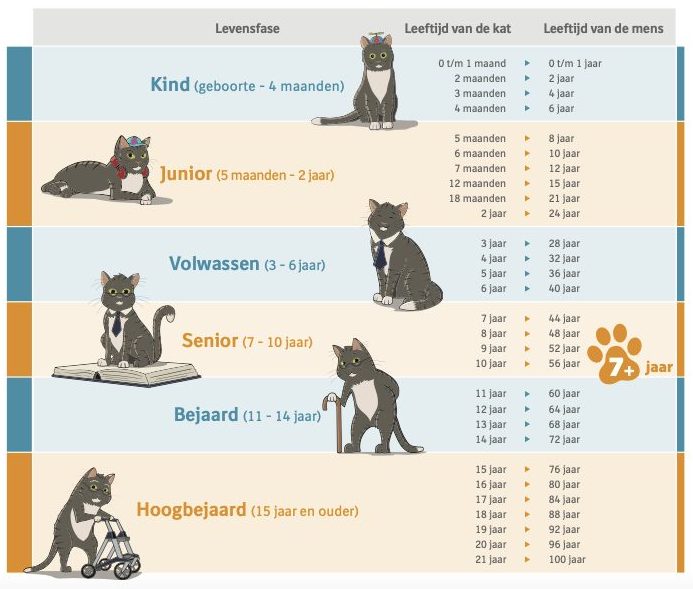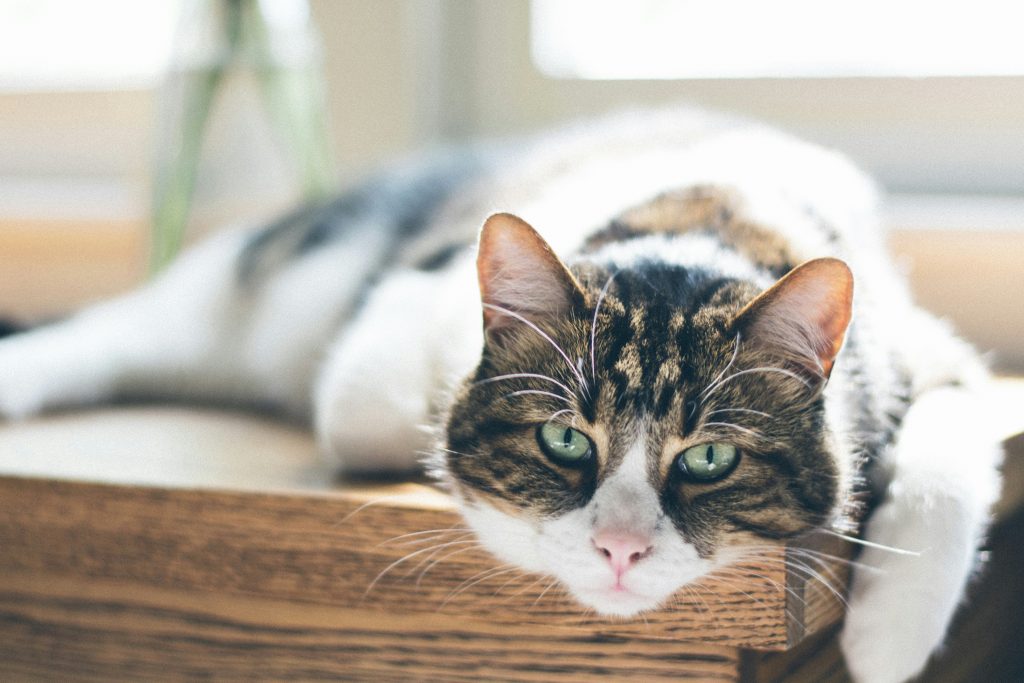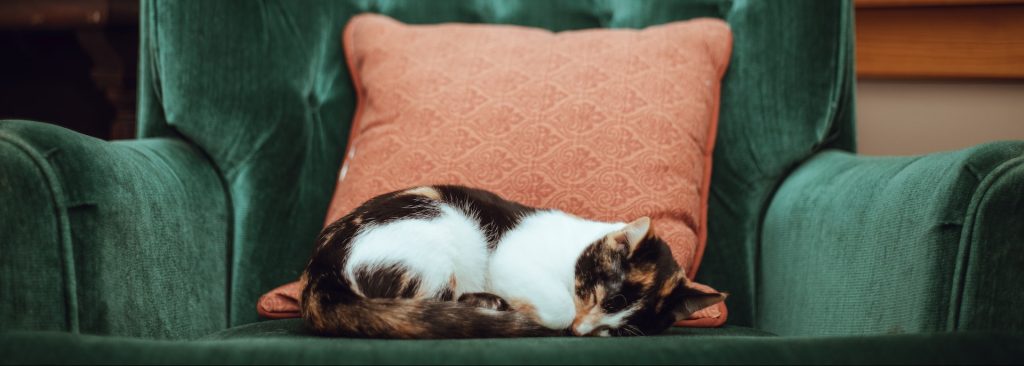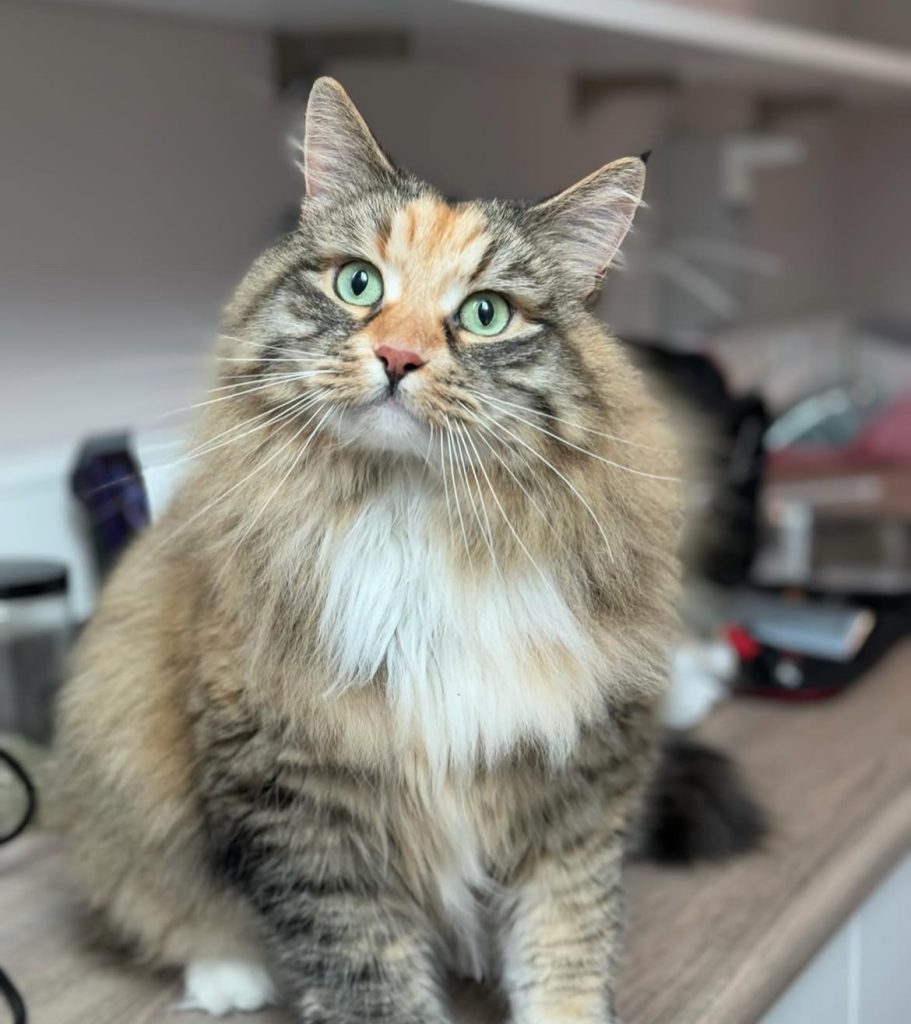How do I care for my senior cat?
Your cat may be a little less active, sleep longer, and sometimes become pickier with food – all signs of aging. This means your cat will need extra attention for their health and wellbeing. That’s why we’ve put together a few practical tips to help you care for your senior cat in the best way possible.
When is a cat considered a senior?

A cat is considered a senior from around 7 years of age. From this point, the risk of age-related issues and health problems increases.
In the image, you can see how a cat’s age translates into human years. This gives you a clear overview of the different life stages of your cat and makes it easier to determine when extra care and attention are needed.
Common health issues in senior cats
Aging itself is not a disease, but older cats are more prone to certain health issues. The most common ones include:
Signs of health issues
Cats are often very good at hiding when something is wrong. However, there are certain signs you can look out for, including:
- Weight loss
- Dull coat
- Increases thirst
- Frequent or plaintive meowing
- Vomiting
- Reduced jumping / stiff movements
- Uncharacteristic behavior, such as hiding, avoiding being petted, or even aggression
If you notice one or more of these signs in your cat, we recommend contacting your veterinarian.
Preventive checkup for your senior cat

Cats often show very few signs when they are not feeling well, which means health issues can go unnoticed and worsen over time. With a preventive health check, we can detect and address problems early. That’s why at De Dierenkliek, we offer the Senior Check for cats.
What can you do yourself?
There are several things you can do to help keep your cat fit and comfortable for as long as possible. The most important points are described below.
Tips for a comfortable home
Cats love warmth, so provide cozy, warm spots where your senior cat can relax. Make sure these places are easy to reach, for example by adding ramps or steps so your cat can also access higher areas.
Make it as easy as possible for your senior cat to meet their basic needs:
- Food and water: Place multiple bowls throughout the house. Vary the types of bowls (small dishes, wide bowls, etc.) and ensure they are easy to access.
- Litter box: Older cats may have trouble with high entry points. Choose a low or easy-access litter box and place it in a convenient location.
Senior cats generally do not like changes in their environment. Try to keep furniture and other household arrangements as stable as possible.
If your cat has poor vision, a nightlight can help them navigate. Always speak to your cat before picking them up, so they are not startled.
Nutrition for senior cats
As cats age, their nutritional needs change. Senior cats often have a slower metabolism, less muscle mass, and a different energy balance compared to younger cats. The function of organs, such as the kidneys, may also change, making tailored nutrition important.
There is special food designed for senior cats that takes these changes into account. This type of nutrition supports a healthy weight, digestion, joints, and organ function, helping your cat stay energetic and vital. Consult your veterinarian to determine which food is best suited for your senior cat.
Coat care
As cats age, it can become more difficult for them to groom themselves properly. This can lead to a matted coat or tangles, which can be uncomfortable and sometimes even painful.
You can help your senior cat by brushing them regularly and checking for any tangles. Not only does this keep the coat healthy and clean, it’s also a wonderful way to give attention to your cat and spot potential problems early. If the coat is severely matted or tangled, you can also contact a professional groomer who can care for your cat’s coat safely and effectively.
Trimming nails
In older cats, nails can become too long because they are less able to groom themselves properly. Reduced flexibility, stiffness, or arthritis can make it harder for nails to wear down naturally. Overgrown nails can grow into the paw, cause pain, and even lead to an abnormal paw posture.
Check your senior cat’s nails regularly and trim them carefully if needed. Here you can learn the best way to trim your cat’s nails. Of course, you are also welcome to visit us at the clinic for help.
Tip: Older cats often use scratching posts less because it can be uncomfortable for their joints. Offer a horizontal scratching surface, ideally made of cardboard, to make scratching easier and more comfortable.
Keeping your senior cat active
Play, and therefore exercise, is very important for a senior cat. Although joints may often be stiff or painful, regular play helps keep them flexible.
Encourage play in a gentle way. You can use a wand toy, small toy, or cat treats to get your cat moving around the house. Make sure to keep the pace slow and comfortable for your cat.
We are confident that you are doing your best to care for your senior cat, and we hope these tips make it even easier for you.
Good luck!


Happy Pet Health Plan
Older cats often require more care and more visits to the veterinarian. Our Happy Pet Health Plan can offer many benefits in this stage of your cat’s life.
Read more

